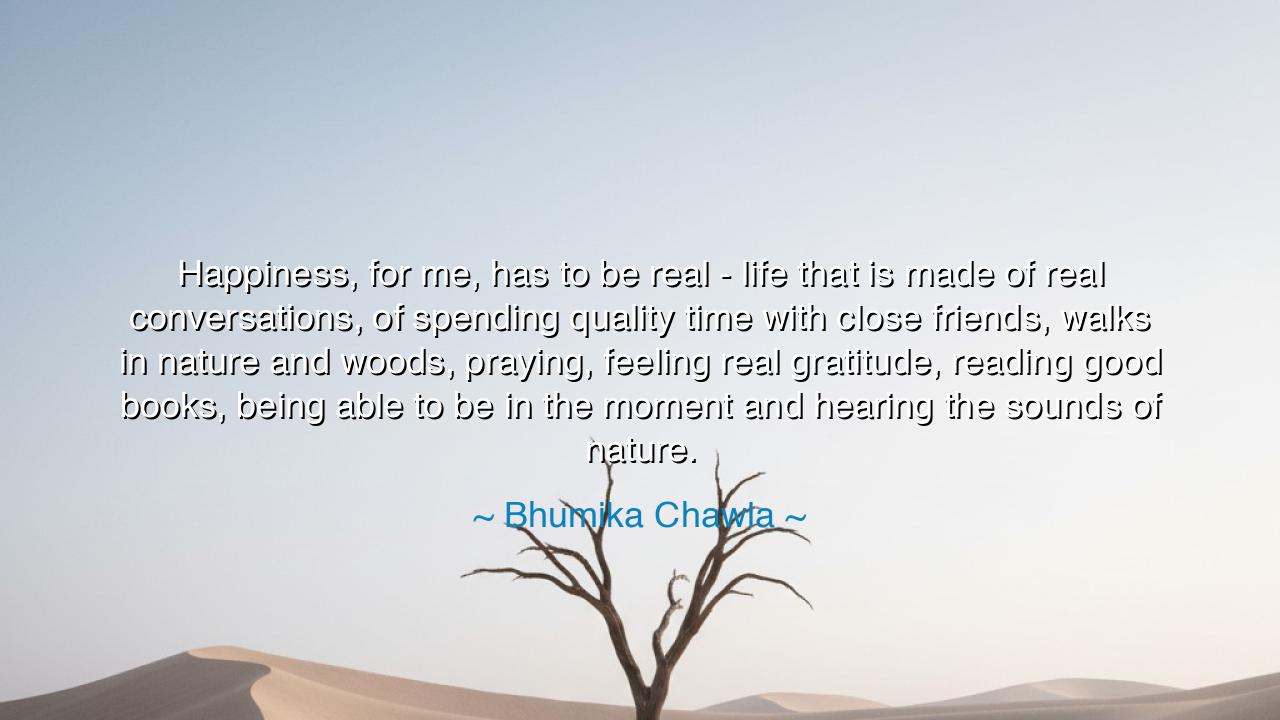
Happiness, for me, has to be real - life that is made of real
Happiness, for me, has to be real - life that is made of real conversations, of spending quality time with close friends, walks in nature and woods, praying, feeling real gratitude, reading good books, being able to be in the moment and hearing the sounds of nature.






“Happiness, for me, has to be real — life that is made of real conversations, of spending quality time with close friends, walks in nature and woods, praying, feeling real gratitude, reading good books, being able to be in the moment and hearing the sounds of nature.” Thus spoke Bhumika Chawla, an artist and seeker of simplicity, whose words echo the ageless wisdom of those who have looked beyond the illusions of wealth and glory to find joy in what is authentic. In this gentle yet profound reflection, she unveils a truth that the ancients knew well — that happiness is not born of possession, but of presence; not of noise, but of stillness; not of achievement, but of connection. Hers is the voice of one who has tasted the vanity of worldly pursuits and returned to the quiet sanctuaries of the soul.
The meaning of her words lies in the rediscovery of the real — that which is tangible to the heart and eternal to the spirit. In a world increasingly consumed by illusion — by artificial light, fleeting praise, and endless distraction — she reminds us that the essence of happiness is simple, yet profound. It is found in conversation that nourishes the heart, in friendship that strengthens the soul, in nature’s silence that restores the mind. She speaks of gratitude, the mother of all virtues, and of prayer, which connects the finite with the infinite. To her, and to the wise of all ages, joy is not a product of what we consume, but a reflection of how we live — attentively, humbly, and in harmony with creation.
The origin of this wisdom comes from a life both public and deeply private. Bhumika Chawla, an actress known for her success in Indian cinema, walked amidst the dazzling lights of fame, yet her heart sought peace beyond the stage. Through her words, one senses a soul who has turned away from the clamor of applause to the quiet rhythm of real life — of mornings spent in reflection, of laughter shared with friends, of books that awaken thought, and of the sacred sound of the wind in the trees. Her definition of happiness arises not from theory, but from experience — from knowing that the world’s rewards are fleeting, but the joy of authenticity endures.
History bears witness to this same truth through lives of both saints and sages. Consider Henry David Thoreau, who left the noise of the city to live by the still waters of Walden Pond. There, in solitude, he discovered that happiness was not in accumulation, but in appreciation. “I went to the woods,” he wrote, “because I wished to live deliberately.” Like Bhumika, he sought the real — the whisper of wind through pine, the quiet mind that listens, the gratitude that flows from simplicity. His experiment, though centuries past, remains a lesson for all ages: that life’s truest joys are not found in the chase, but in the pause.
To live as she describes — with real conversations, real gratitude, and presence in the moment — is to resist the illusion that happiness can be bought or measured. It is to awaken each day with wonder, to greet each friend as a gift, and to meet each moment without haste. It is to walk barefoot upon the earth and remember that we are part of a greater whole — bound not by fame or fortune, but by the shared pulse of life itself. The sounds of nature, which she names with reverence, are not mere background; they are the voice of the divine reminding us of our place in the grand design.
And yet, her words are also a quiet act of rebellion. In an age that glorifies busyness and digital illusion, to choose stillness is revolutionary. To step away from the glowing screen and into the living world is to reclaim one’s soul. To read a good book, to listen instead of scrolling, to sit beneath the trees and breathe — these are not luxuries, but acts of restoration. It takes courage to turn away from the counterfeit pleasures of the age and seek instead the real happiness that dwells in simplicity and depth.
The lesson, then, is luminous: seek reality over appearance, connection over distraction, gratitude over desire. Happiness is not a goal to be hunted, but a way of seeing — a sacred alignment of the heart with what is real and eternal. Begin, then, each day with awareness: speak to your loved ones with presence, walk among the trees with reverence, give thanks for the smallest blessings. In doing so, you will find, as Bhumika Chawla has found, that the truest happiness is not loud, nor fleeting, nor distant — it is humble, quiet, and near, waiting in the stillness for those who have the wisdom to listen.






AAdministratorAdministrator
Welcome, honored guests. Please leave a comment, we will respond soon